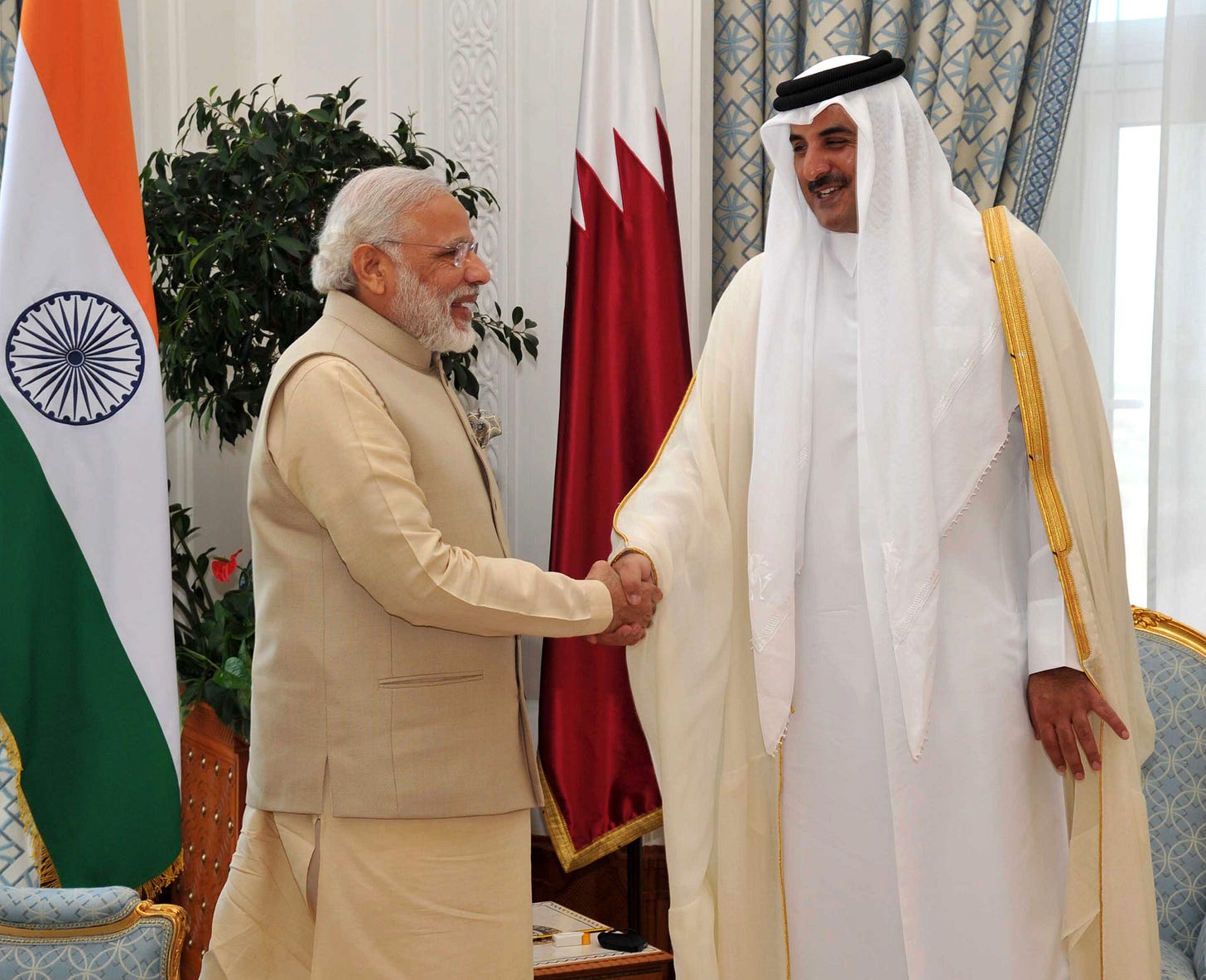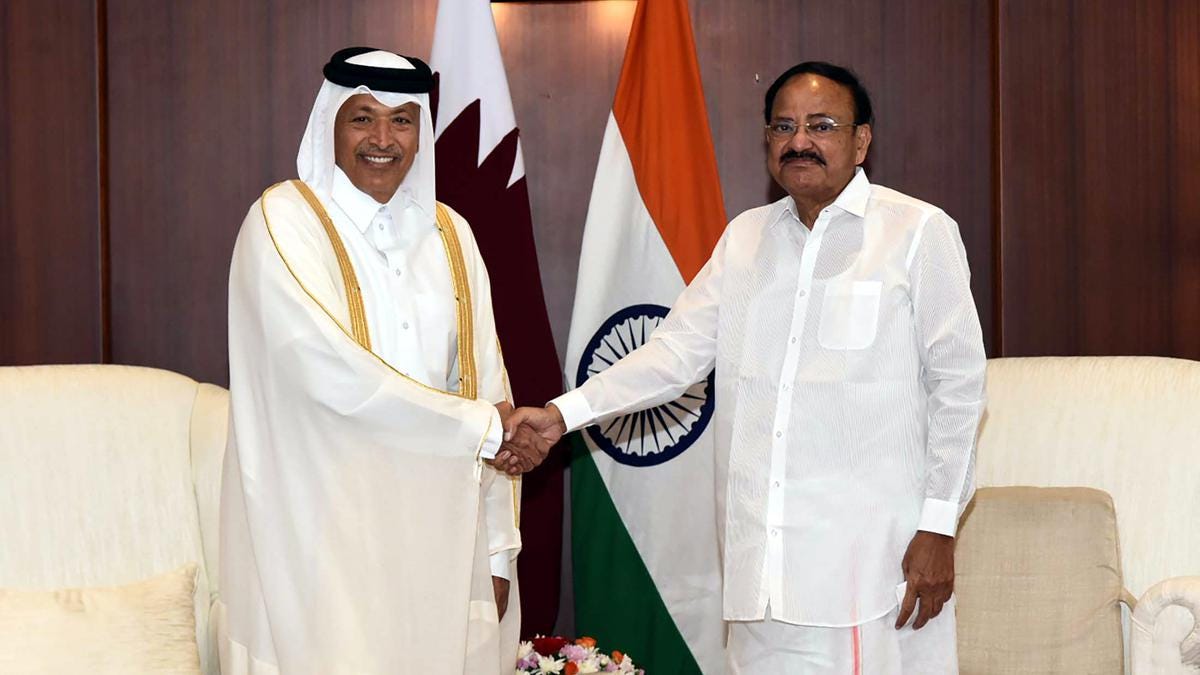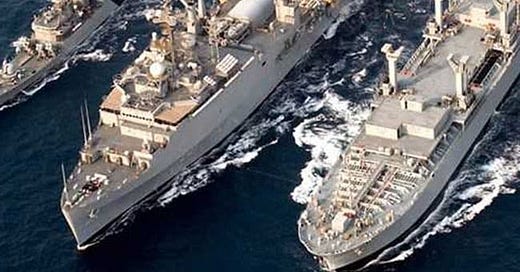Qatar Sentences 8 Ex-Indian Navy Men to Death: The Full Story
Who, Where, When,Why, How,What Next?
Introduction
In a startling development that has rattled India's diplomatic circles, eight former Indian Navy personnel have been sentenced to death by a judicial court in Qatar. The Ministry of External Affairs (MEA) has termed the verdict "deeply shocking" and is reportedly pursuing all possible avenues, both formal and informal, to secure the safe return of these Indian nationals.

Who Are The Sentenced?
The eight individuals awarded death penalty have had distinguished careers in the Indian Navy. Their areas of expertise range from navigation and engineering to communications and gunnery. Most had served in the Navy for up to 20 years and held important positions.
Who Are These Men?
Captain Navtej Gill (Retd): A highly decorated officer hailing from Chandigarh, he served notable appointments, including navigating officer at INS Viraat.
Commander Sugunakar Pakala (Retd): An engineering officer, he holds the unique record of crossing the equator twice aboard INS Tarangini.
Captain Saurabh Vashisht (Retd): An engineering officer with multiple commendations from the Commander-in-Chief.
Commander Purnendu Tiwari (Retd): A navigation specialist who received the Pravasi Bharatiya Samman award in 2019.
Captain BK Verma (Retd): A navigation specialist, he was a topper at the Staff College course.
Commander Amit Nagpal (Retd): Specialised in communications during his tenure in the Navy.
Commander SK Gupta (Retd): Specialised in Gunnery.
Ragesh: The only non-commissioned officer among them; served as a sailor in the Navy.
What Were They Doing in Qatar?
These men were employed by Dahra Global Technologies and Consultancy Services1, a private company contracted to train the Qatari Naval staff. However, they were arrested on espionage charges, a crime that carries the death penalty in Qatar. It remains unclear whether the firm's top management or its CEO, Khamis Al-Ajmi, has also been held accountable.

Diplomatic Relations Between India and Qatar
Prime Minister Narendra Modi and the Emir of Qatar, Sheikh Tamim Bin Hamad Al Thani, enjoy a strong personal rapport that serves to further strengthen the robust diplomatic relations between India and Qatar. These ties are fortified by substantial economic partnerships and mutual respect for each other's sovereignty.
Additionally, Qatar has been an influential peace broker on the global stage, notably securing the release of two American hostages from Hamas in Gaza2. Given this positive backdrop and Qatar's history in diplomatic resolutions, the harsh sentencing of Indian nationals is a particularly unexpected and unsettling development. However, the strength of these cordial relations and Qatar's role in peace brokering provide a glimmer of hope that the death sentences may not be carried out, leading to a satisfactory resolution for all stakeholders.
Lessons to Be Drawn
1. Due Diligence is Crucial
Individuals with defence backgrounds working abroad, particularly in fields related to security and defence, should exercise extreme caution. Due diligence before accepting any assignment is imperative to avoid falling into legal and diplomatic traps.
2. Dilemma of Self-reliance
For cash-rich countries like Qatar aiming to develop indigenous defence capabilities, recruiting foreign expertise may be the only viable option. However, this approach carries inherent risks, such as potential leaks of sensitive information to hostile powers. This issue is particularly pressing given Qatar's precarious geopolitical position in the volatile Persian Gulf.
3. Diplomatic Proactivity Needed
The Indian mission in Qatar could arguably have been more proactive. They might have provided legal assistance during the trial stage, thereby possibly influencing the outcome in a more favourable direction for the accused.
Final Thoughts
While it's easy to point fingers post-facto, the situation calls for a balanced, strategic approach to secure the release of the eight personnel. Given the gravity of the situation and the irreversible nature of the death sentence, all diplomatic channels should be utilised to bring these men back to Indian soil.
One can only hope that the long-standing good relations between India and Qatar can pave the way for a re-evaluation of the case and that a more lenient penalty may be considered. On the other hand, if the charges are substantiated, it will be a difficult road ahead for all parties involved.
This incident serves as a wake-up call not just for the individuals who opt for overseas assignments in sensitive sectors but also for the government’s diplomatic missions that need to be more vigilant in safeguarding the interests of their citizens abroad.
Addendum/ Epilogue

A Closer Look at India-Qatar Diplomatic Relations (Exclusive Input)
A well-informed expert in Foreign Affairs, who opted to remain anonymous, reached out, after perusing our article, to provide deep insights into the increasingly bristled diplomatic relationship between India and Qatar.
The relationship, he stated, took a downward turn during Vice President Venkaiah Naidu's visit to Doha from 4 to 7 June 2022. At this time, Nupur Sharma, a spokesperson for India's ruling Bharatiya Janata Party (BJP), had made incendiary remarks about Prophet Muhammad (PBUH). This led to the abrupt cancellation of Mr Naidu's key activities in Doha, including a dinner meeting with Qatar's Deputy Emir and a planned press conference, leaving a lasting shadow on bilateral relations for the past year.
Furthermore, the source highlighted that Qatar often utilises media platforms like Al Jazeera Arabic to spotlight incidents of alleged anti-Muslim violence in India and to articulate a contentious position on the Kashmir issue. The prior Indian Ambassador to Qatar, who now serves as Joint Secretary in the Prime Minister's Office, made concerted efforts to stabilise these relations. However, our source cautions that the efficacy of the Foreign Ministry wanes significantly once intelligence agencies get involved, adding layers of complexity to an already intricate diplomatic milieu.
The situation, he went on to elucidate, is further complicated by Qatar's alignment with groups like Hamas and the ongoing conflict between Israel and Gaza. While the Court of Cassation in Qatar offers a venue for legal appeals, the source was sceptical about the likelihood of a favourable ruling. Drawing upon the analogous experiences of a previous Indian ambassador to the UAE, the source emphasised that even strong diplomatic relationships are not a panacea for resolving complex geopolitical issues, where death penalty is involved.
In closing, the expert noted that despite Qatar's absence of democratic institutions and a transparent rule of law, the Emir retains the ultimate power to issue pardons. Exercising this authority would likely necessitate direct intervention from India's Prime Minister, or at the very least, the National Security Advisor.
Another Insightful Comment
Another perceptive comment, which I've included below with only minor editing, was formally presented in our main article. Whether or not you find yourself in agreement with the viewpoint, it undoubtedly offers a deep and intriguing perspective.
“My assessment is that the relationship between India and GCC countries has evolved. What was once a relationship rooted in mutual respect and admiration has increasingly become one of convenience. Arab intellectuals have grown more cautious, questioning India's intentions.
“As for the espionage charges, they have cleared the first stage of judicial review, with two more appellate rounds remaining. The influence of bilateral relations, whether warm or otherwise, cannot be dismissed. The King will have the final say when considering an appeal for mercy. My expectation is that he would likely grant a pardon, but not without making a strategic point. Should this happen, Prime Minister Modi will likely leverage it during elections as a display of successful diplomacy with Qatar. Conversely, if a pardon is not granted, which seems unlikely, the situation could be used to subtly fuel a campaign against a specific community. It's unfortunate that our foreign policy has increasingly become an extension of domestic political strategies.
“On a lighter note, it's worth mentioning that Arabs prefer not to use the term 'Persian Gulf'; they are much more inclined to call it the 'Arabian Gulf'.”
Dahra.com is their web-site.
Qatar's Quintessential Diplomacy: Diffusing Flashpoints Between Sworn Enemies
The Qatar-Hamas Mediation In a significant development that has captured global headlines, two American hostages were recently released by Hamas, the Palestinian organization labelled as a terrorist group by the United States and the European …







Generally speaking , it is a set back for Indian image. They are still reeling from Canadian episode. This verdict perhaps will draw negative attention for Qatar due to severity and people involved. Death penalty regardless of crime is not what modern and civilized societies approve. Modi government will not let this happen on their watch. Some may label the endeavor politically motivated but their record of rescuing Indians each time from all over the world is consistent. Lastly , this will be a blow to Qatar to attract talented human capital. There may be mass exodus to other places. All developed countries with diminishing populations are actively promoting immigration for talented people.
My $0.02
My assessment is that relationship between India and GCC countries has acquired a new hue. The relationship of natural love is considerably substituted by relationship of convenience. The Arab intellectuals have grown suspicious of India’s motives.
The charges of espionage have passed through first stage of judicial trial. Two more appellate stages are yet to be crossed but role of relationship warmth or lack of it can’t be underplayed. The final arbitrator will be the King when exercising his judgment over appeal for mercy. My guess is that he would pardon but after scoring a point. Mr. Modi will encash this in election for “successful arm-twisting” of Qatar & securing release. God Forbid, if no pardon is granted (highly unlikely), Mr. Modi will convert it into subtle campaign against “a community”. Unfortunately our foreign policy is no longer focused on international considerations. It is extension of domestic policies in foreign soil.
On a trivial note, Arabs don’t like the term “Persian gulf”. They love to call it “Arabian Gulf”.